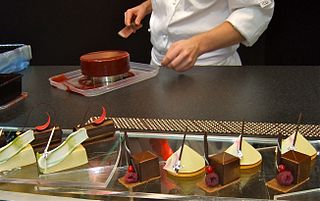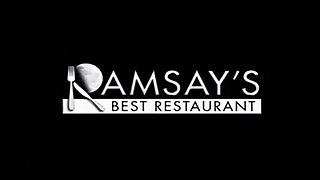
A chef is a professional cook and tradesman who is proficient in all aspects of food preparation, often focusing on a particular cuisine. The word "chef" is derived from the term chef de cuisine, the director or head of a kitchen. Chefs can receive formal training from an institution, as well as by apprenticing with an experienced chef.

Waiting staff (BrE), waiters / waitresses, or servers (AmE) are those who work at a restaurant, a diner, or a bar and sometimes in private homes, attending to customers by supplying them with food and drink as requested. Waiting staff follow rules and guidelines determined by the manager. Waiting staff carry out many different tasks, such as taking orders, food-running, polishing dishes and silverware, helping bus tables, entertaining patrons, restocking working stations with needed supplies, and handing out the bill.

In a restaurant, the menu is a list of food and beverages offered to customers and the prices. A menu may be à la carte – which presents a list of options from which customers choose – or table d'hôte, in which case a pre-established sequence of courses is offered. Menus may be printed on paper sheets provided to the diners, put on a large poster or display board inside the establishment, displayed outside the restaurant, or put on a digital screen. Since the late 1990s, some restaurants have put their menus online.
A sous-chef is a chef who is second in command of a kitchen, ranking directly below the head chef. In large kitchens, sous-chefs generally manage members of the kitchen on behalf of the head chef, who is usually preoccupied with other tasks.

A pastry chef or pâtissier, is a station chef in a professional kitchen, skilled in the making of pastries, desserts, breads and other baked goods. They are employed in large hotels, bistros, restaurants, bakeries, and some cafés.

A buffet can be either a sideboard or a system of serving meals in which food is placed in a public area where the diners serve themselves. A form of service à la française, buffets are offered at various places including hotels, restaurants, and many social events. Buffet restaurants normally offer all-you-can-eat food for a set price, but some measure prices by weight or by number of dishes. Buffets usually have some or mostly hot dishes, so the term cold buffet has been developed to describe formats lacking hot food. Hot or cold buffets usually involve dishware and utensils, but a finger buffet is an array of foods that are designed to be small and easily consumed only by hand, such as cupcakes, slices of pizza, foods on cocktail sticks, etc.
A personal chef is a chef who is hired by different clients and prepares meals in the clients' home kitchens, based on their needs and preferences.
Brigade de cuisine is a system of hierarchy found in restaurants and hotels employing extensive staff, commonly referred to as "kitchen staff" in English-speaking countries.

A chef de cuisine or head chef is a chef that leads a kitchen and its cooks. A chef patron or executive chef is a chef that manages multiple kitchens and their staff.
Restaurants fall into several industry classifications, based upon menu style, preparation methods and pricing, as well as the means by which the food is served to the customer. This article mainly describes the situation in the US, while categorisation differs widely around the world.
A hotel manager, hotelier, or lodging manager is a person who manages the operation of a hotel, motel, resort, or other lodging-related establishment. Management of a hotel operation includes, but is not limited to management of hotel staff, business management, upkeep and sanitary standards of hotel facilities, guest satisfaction and customer service, marketing management, sales management, revenue management, financial accounting, purchasing, and other functions. The title "hotel manager" or "hotelier" often refers to the hotel's general manager who serves as a hotel's head executive, though their duties and responsibilities vary depending on the hotel's size, purpose, and expectations from ownership. The hotel's general manager is often supported by subordinate department managers that are responsible for individual departments and key functions of the hotel operations.

Conrad Gallagher is an Irish-born chef/restaurateur from Letterkenny, County Donegal, based in Dubai since 2016. He was the youngest chef ever awarded a Michelin star at the time, for Peacock Alley in Dublin, at the age of 26 in 1998. In a career that has attracted both accolades and controversy, Gallagher has owned restaurants in Dublin, New York, London, Las Vegas and Cape Town, and has featured in two reality television cooking series. He opened restaurant consultancy Food Concepts 360 in 2018. Gallagher also owns chef recruitment agency The Chefs Connection and opened The Chefs Playground in Johannesburg, South Africa, in April 2020 as a culinary training centre and specialist shop for chefs’ apparel and equipment. In February 2021, Gallagher opened "Off the Menu Food Emporium", a delicatessen, coffee and wine shop serving tapas-style meals, in Port Elizabeth, South Africa. He also opened Bistro Vin de Boeuf, in St Francis Bay.

Online food ordering is the process of ordering food, for delivery or pickup, from a website or other application. The product can be either ready-to-eat food or food that has not been specially prepared for direct consumption.
The fifth season of the American reality television series The Next Food Network Star premiered on Sunday, June 7, 2009. Food Network executives, Bob Tuschman and Susie Fogelson, were joined by Bobby Flay as the Selection Committee for this season, which was filmed early 2009 in New York, New York and Miami, Florida.

Schwa is an upscale restaurant run by chef-owner Michael Carlson and chef de cuisine Papi Chulo. It is located on Ashland Avenue in Wicker Park, Chicago, and is known for its unconventional approach to foodservice. Simple table settings match the building's drab exterior and its tiny 26-seat interior. The restaurant employs no support staff of any kind. Chefs interact directly with customers and are encouraged to act as silly as they wish, as long as they produce top quality food.

Ramsay's Best Restaurant is a television programme featuring British celebrity chef Gordon Ramsay broadcast on Channel 4. During the series restaurants from all over Britain competed in order to win the "Ramsay's Best Restaurant" title. The initial 16 restaurants were selected by Ramsay from a pool of some 12,000 entries submitted by Channel 4 viewers.

Eleven Madison Park is a fine dining restaurant located inside the Metropolitan Life North Building at 11 Madison Avenue in the Flatiron District of Manhattan, New York City. Owned by chef Daniel Humm's Make it Nice group, it has held 3 Michelin stars since 2012, and was ranked first among The World's 50 Best Restaurants in 2017.

The Whitebrook, formerly known as The Crown at Whitebrook, is a restaurant with rooms in Whitebrook, 6 miles (9.7 km) south-south-east of Monmouth, Monmouthshire, Wales, near the River Wye and the border with England. The building is thought to date from the 17th century and by the 19th century it was used as a roadside inn. Its restaurant was run by Chef Patron James Sommerin until 2013; it gained a Michelin star in 2007. It contains eight double rooms and a 2-acre (0.81 ha) garden. On 7 March 2013, it closed because of financial difficulties; at the time it had the longest held Michelin star in Wales. Critics praised the food under Sommerin, but have criticised the difficulty in finding the restaurant. It re-opened in October 2013 under new chef and owner Chris Harrod, and regained the Michelin star in 2014. Harrod serves a menu using locally produced meat and vegetables along with foraged ingredients such as charlock, hedge bedstraw and pennywort.

Gordon Ramsay at Claridge's was a restaurant owned by Gordon Ramsay and located with Claridge's hotel in Mayfair, London. Blackstone Group had enquired about Ramsay's availability to open a restaurant after he was awarded three Michelin Stars at Restaurant Gordon Ramsay. It marked the first of a number of restaurants that Ramsay would open at hotels owned by Blackstone. It opened in 2001, and by the fourth year was making a profit of £2 million a year. Mark Sargeant was the chef de cuisine of the restaurant until 2008, during which time the restaurant was awarded a Michelin star.














